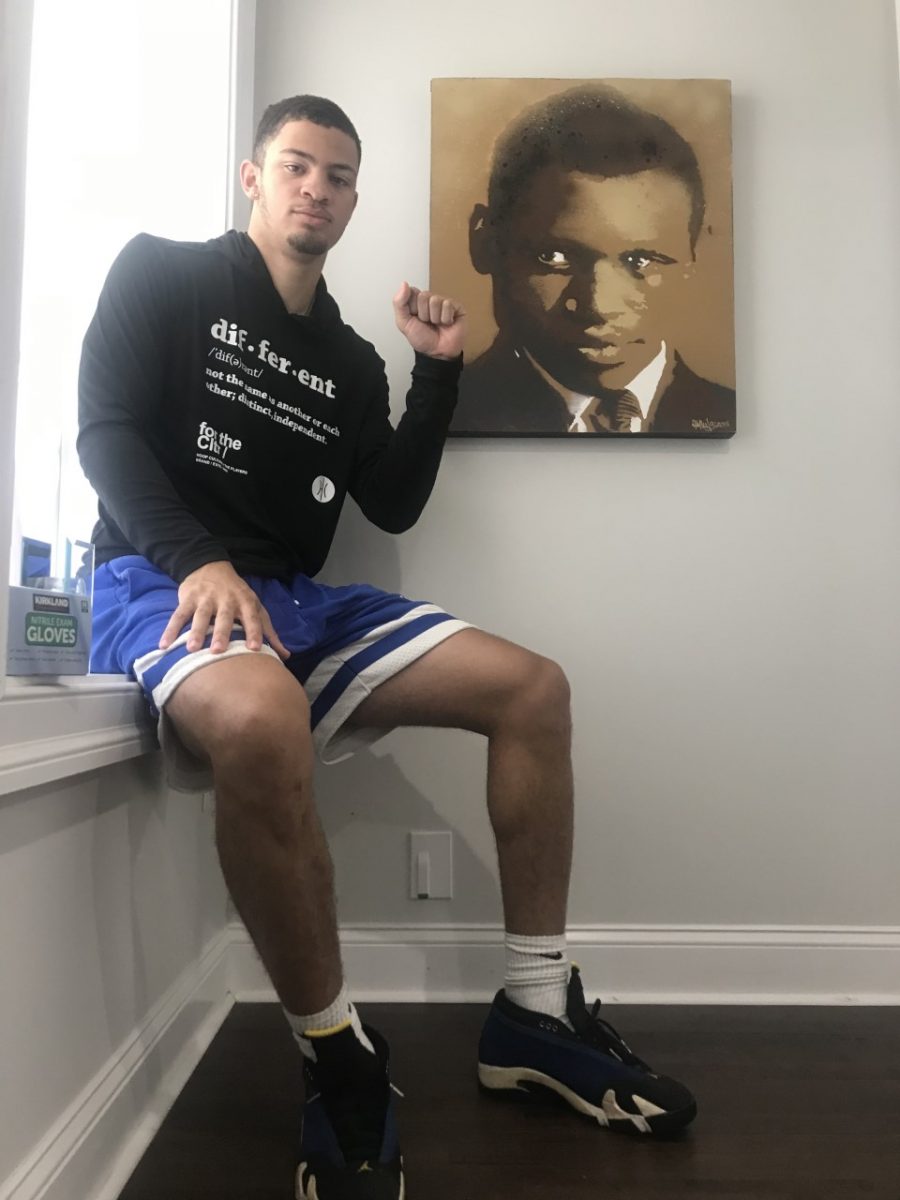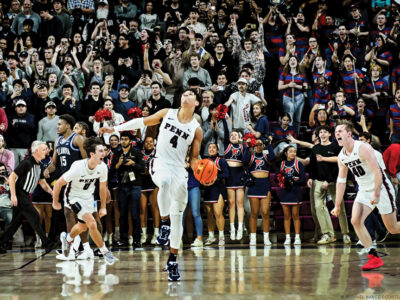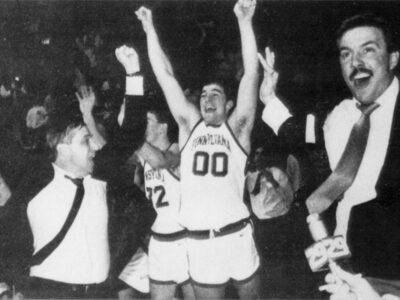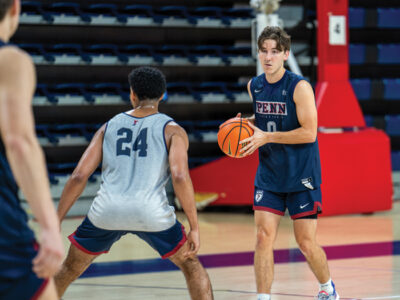
Penn basketball guard Jelani Williams has been going to protests, making his voice heard on campus, and promoting messages of “love and respect.”
Jelani Williams escaped the tear gas but not the tears.
The Penn basketball guard was at a protest near the White House on June 1 when his mother, who had a foreboding feeling while watching TV at home, texted him to get out of there. So he did— just a few moments before federal law enforcement officers fired rubber bullets and chemical gas at peaceful protesters to clear a path for President Donald Trump W’68’s infamous photo shoot in front of St. John’s Episcopal Church.
“It was pretty draining,” says Williams, a Washington, DC, native and rising senior at Penn. “As I walked home with friends, I was thinking about how I didn’t even know what they were doing it for since the curfew hadn’t happened yet. When I got home and saw it was for Trump trying to get a picture, I started crying honestly. It didn’t make sense to me why something like that could be allowed to happen.”
But it hasn’t stopped him from attending other Black Lives Matter protests that have swept the nation since the police killing of George Floyd in Minneapolis on May 25. If anything, it’s led to him becoming an outspoken University student leader on issues of systemic racism, police violence, and Black history education. “The next day,” Williams says, “I woke up feeling really energized and determined to make as much change as I could within my own sphere of influence and trying to push Penn to do the same thing.”
College sports has been one sphere in which the movement has taken shape in recent weeks, as Black athletes, often leaders on a field or court, have swept aside the old “stick to sports” mantra to publicly air their grievances. Williams paid close attention in mid-June when Oklahoma State football star Chuba Hubbard tweeted that he would “not be doing anything with Oklahoma State until things change” after head coach Mike Gundy was photographed wearing an OAN T-shirt. (OAN, or One America News, is a far-right news network where a host once called the Black Lives Matter movement a “farce.”) A week later, Mississippi State running back Kylin Hill declared that he would no longer represent the state of Mississippi unless its state flag, which features a Confederate symbol, is changed.
“The power dynamic within college athletics has to be addressed,” Williams says. “Until real change comes, it’s important for us to use our platforms to speak about it—and if it gets to that point, really take a stand behind something.”
While most big-time college football programs in the South and Midwest probably have a more glaring disconnect between their Black athletes and coaches and fans, Williams would like to see the Ivy League take the lead on social justice issues. He was pleased to see the Ivies suspend athletic activities on Election Day and Penn Athletics announce its first steps to combat racism—which include appointing a chief diversity officer for the department, growing civic engagement programming in West Philadelphia, and expanding implicit bias training to all coaches, staff, and student-athletes. Along with Penn volleyball player Raven Sulaimon and track athletes Marvin Morgan and Demetri Whitsett, Williams is also helping to launch a group called Black Student Athletes at Penn to create a physical meeting space and foster dialogue. And he’s sent out resources to his basketball teammates and coaches so they can further educate themselves on African American history.
But while Williams, an Africana studies minor, is proud to be on a diverse team with a supportive group of coaches—including top assistant Nat Graham C’97, who in recent weeks has written thoughtfully on race issues—he’d like to see the University do more to address “a racial divide” he’s seen in other parts of campus, from Greek life to the dorms, and increase the number of Black faculty members and staff. “I do believe we have the power and the responsibility to make some change here,” says Williams, pointing out there currently aren’t any Penn head coaches who are Black.
Williams learned from a young age how pivotal college can be in shaping your worldview. His grandmother was attending Morgan State when Martin Luther King Jr. was assassinated and the National Guard was sent in to surround the university in an attempt to quell the 1968 Baltimore riot. And while his parents were at Hampton University, they had a college friend whose young son was killed by the police for playing with a toy gun. That tragedy was on his parents’ minds when they sat Jelani down when he was nine or 10 to give him the talk all African American kids get about how to interact with police. “My parents were like, ‘Listen, you’re a tall Black man in America—that’s beautiful, that’s a great thing. But it also comes with some danger and some things you have to look out for.’”
Williams didn’t always get the same kind of instructive lessons from his teachers, often resorting to his own research to learn about the history of race in America. For him, “the biggest issue is the way we educate our children” at the K–12 level. It has to go well beyond Abraham Lincoln and MLK, “because Black people in this country have been through a lot but have also produced some of the most brilliant people ever seen, and that part of the history gets overlooked as well,” he says. “I think integrating into the curriculum the truth about Black people and the Black experience can really effect change that goes past policies, that goes past anti-bias training and different things universities are trying to do to appear more progressive right now.”
More education, in turn, should lead to more empathy, respect, and ultimately equality. And as terrible as things might seem in the country right now, he says he’s been feeling “hopeful” that better days lie ahead.
“I’m glad we’re having this conversation; it’s a conversation that’s about 400-and-something years overdue,” he says, pointing out that people “can’t look away” since we’re in the middle of a pandemic. To that end, he had been hoping the NBA wouldn’t return this summer, because “we have to be careful allowing the conversation to shift because if we do that we can get rocked right back to sleep and this country can go back to doing what it’s been doing for hundreds of years.” (At the same time, Williams has been working hard himself on the basketball court, after missing all of his first three seasons due to three separate ACL tears. A highly touted recruit once expected to be a generational talent at Penn, the point guard slowed down his academic track so he still has two seasons of eligibility remaining for the Quakers, and at least another one beyond that if he transfers to another school to get a graduate degree.)
“It’s not just about thoughts and prayers, and being there for your Black friends,” he adds. “It’s about understanding why this is happening, and taking the time to educate yourself. The key to all of this is education. We have to learn about each other’s struggles, and each other’s successes. As we continue to do that, that’ll help you in your interpersonal relationships and that will eventually spread across the country.
“The baseline of this movement is love and respect. The sooner we all get on the same page with that, the quicker it’ll get better.” —DZ





“My parents were like, ‘Listen, you’re a tall Black man in America—that’s beautiful, that’s a great thing. But it also comes with some danger and some things you have to look out for.’”
I couldn’t agree more with that paragraph. But on the other hand, the same can be said about white people in America. All people without exception should think about their safety. And it doesn’t depend on the color of their skin.
This statement in your opening paragraph, which sets the tone for your entire article, is completely false: ” just a few moments before federal law enforcement officers fired rubber bullets and chemical gas at peaceful protesters to clear a path for President Donald Trump W’68’s infamous photo shoot in front of St. John’s Episcopal Church.”
Are you going to correct this for the record ? Perhaps you didn’t know the facts when you wrote the article, but this is a well documented falsehood and any responsible journalist would issue a clear and public correction. I suggest, for example, that you watch AG William Barr’s Face the Nation interview that took place several days after the false narrative that you cite took hold, and read the entire transcript so that you see his full comments, some of which CBS refused to air, regarding the violent nature of the protests that took place and that the clearing of the park was unconnected to President Trump’s later visit, which Barr had no awareness of when giving the order to clear the park (at which no tear gas or rubber bullets were used).
https://www.washingtonexaminer.com/news/not-peaceful-protesters-barr-defends-police-actions-at-lafayette-park-by-pointing-to-last-weekends-violence
There is more than enough misinformation and propaganda going around politically these days, and the Pennsylvania Gazette should strive to do better.